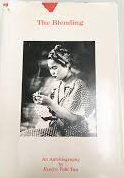Articles/Essays – Volume 12, No. 4
A Woman Not Defeated | Evelyn Yoki Tan, The Blending
In this era of the “Women’s Movement,” scholars are looking for documentation to rectify past neglects, and women in general are looking for “roots” and role models. There is a searching of materials by, for and about women—used to assuage guilt, to uphold cherished assumptions and even to provide greater understanding of women’s experiences and feelings. Since women have not often been the writers of history or social commentary nor the subjects of archival collections, such material is difficult to find. The Blending, the autobiography of Evelyn Yoki Tan, is therefore a welcome contribution.
Evelyn Yoki Tan, a prominent California businesswoman, was born in Hawaii of Okinawan parents, was married to and later divorced from a man of Chinese-Portugese descent, converted to Mormonism, and with luck and ability, competed successfully in a male-dominated business world. The Blending is the recounting of the family history, the cultural, generational and personal conflicts and contradictions, the events and decisions which propelled her out of her heritage, out of her traditions and out of her assumed roles.
Tan tells her story in a simple, straightforward manner. This style may be disconcerting to those demanding literary flourishes and those hoping for more intensely described drama. Others may also dismiss The Blending because its vanity press publisher has included slightly embarrassing testimonials from political, business and academic notables.
Tan is a woman who has experienced all the prescribed roles for women— dutiful daughter, supportive sister, loving wife and mother. Her descriptions of fulfilling those roles contribute to our greater understanding of their variety and complexity. She has also experienced the typical woman’s roles as the transmitter of culture and the transient from one culture to another.
Tan remembers and uses Okinawan words; she lovingly describes the old customs; she dedicates her book to her parents in appreciation for their traditions. But she also discusses her marriage outside of her race and culture and her subsequent ostracism. She relates her process of “westernization” — cutting her hair, going to school, adopting that most American of religions—Mormonism. She describes her movement away from dependency on family and husband towards independence and self-sufficiency.
Tan sees her life as a blending of these roles. She sees her life as concililation even though confrontation has punctuated much of it. One wonders if the conciliation is a reflection of success and security. Tan is a woman whom circumstance and character have not defeated.
Since the autobiography covers Tan’s life only to 1950, one also wonders about the years spent away from the multienthic environment of Hawaii and about the years spent achieving her economic security. And one wonders how Tan views her life and herself in relation to other women and in relation to the continuing struggle of women to find their place in American and in Mormon society.
Perhaps Tan will deal with these topics in another book. One hopes so. In the meantime, The Blending is a fine contribution to the literature about women, about women’s roles, about women’s experiences.
The Blending. By Evelyn Yoki Tan. Hollywood, Calif.: Cameron McKay Productions, 1978. 195 pp.


 Back to full Issue
Back to full Issue

